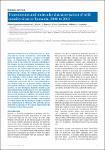Transmission and molecular characterisation of wild measles virus in Romania, 2008 to 2012
Necula, Gheorghe
Lazar, M.
Stanescu, A.
Pistol, A.
Santibanez, Sabine
Mankertz, Annette
Lupulescu, E.
Molecular characterisation of measles virus is a powerful tool for tracing transmission. Genotyping may prove the absence of endemic circulation of measles virus, i.e. transmission for more than 12 months, which is one of the criteria for verifying elimination of the disease. We have genetically characterised measles viruses detected in Romania from 2008 to 2012, focusing on the recent outbreaks from 2010 to 2012 that affected mainly groups with limited access to healthcare and schools. The findings emphasise the importance of genotyping during the different phases of an outbreak. A total of 8,170 cases were notified, and 5,093 (62%) of the 7,559 possible cases were serologically confirmed. RT-PCR was performed for 104 samples: from the 101 positive samples obtained from sporadic measles cases or clusters from different counties, 73 were genotyped. Sporadic measles cases associated with D4 and D5 viruses were observed from 2008 to 2009. Genotype D4-Manchester was predominant in 2011 and 2012. In addition, the related variant D4-Maramures and MVs/Limoges.FRA/17.10[D4] and a few D4-Hamburg strains were detected. The detection of several distinct MV-D4 genotypes suggests multiple virus importations to Romania. The outbreak associated with D4 genotype is the second largest outbreak in Romania in less than 10 years.
No license information
Related Items
Show related Items with similar Title, Author, Creator or Subject.
-
2014-09-04ZeitschriftenartikelMeasles virus spread initiated at international mass gatherings in Europe, 2011 Santibanez, Sabine; Prosenc, K.; Lohr, D.; Pfaff, Günter; Markocic, O. Jordan; Mankertz, AnnetteThree parallel transmission chains of measles virus (MV) variant ‘D8-Villupuram’ (D8-V) originated from two coinciding international mass gathering (MG) events in Rimini, Italy, in June 2011. MV D8-V was independently ...
-
2011-08-01ZeitschriftenartikelSpread of Measles Virus D4-Hamburg, Europe, 2008–2011 Mankertz, Annette; Mihneva, Zefira; Gold, Hermann; Baumgarte, Sigrid; Baillot, Armin; Helble, Rudolph; Roggendorf, Hedwig; Bosevska, Golubinka; Nedeljkovic, Jasminka; Makowka, Agata; Hutse, Veronik; Holzmann, Heidemarie; Aberle, Stefan W.; Cordey, Samuel; Necula, Gheorghe; Mentis, Andreas; Korukluoğlu, Gulay; Carr, Michael; Brown, Kevin E.; Hübschen, Judith M.; Muller, Claude P.; Mulders, Mick N.; Santibanez, SabineA new strain of measles virus, D4-Hamburg, was imported from London to Hamburg in December 2008 and subsequently spread to Bulgaria, where an outbreak of >24,300 cases was observed. We analyzed spread of the virus to ...
-
2009-07-22ZeitschriftenartikelMeasles viruses of genotype H1 evade recognition by vaccine-induced neutralizing antibodies targeting the linear haemagglutinin noose epitope Finsterbusch, Tim; Wolbert, Anne; Deitemeier, Ingrid; Meyer, Kerstin; Mosquera, Maria Mar; Mankertz, Annette; Santibanez, SabineThe linear haemagglutinin noose epitope (HNE; aa 379-410) is a protective B-cell epitope and considered to be highly conserved in both the vaccine and the wild-type measles virus (MeV) haemagglutinin (H) proteins. Vaccine ...

